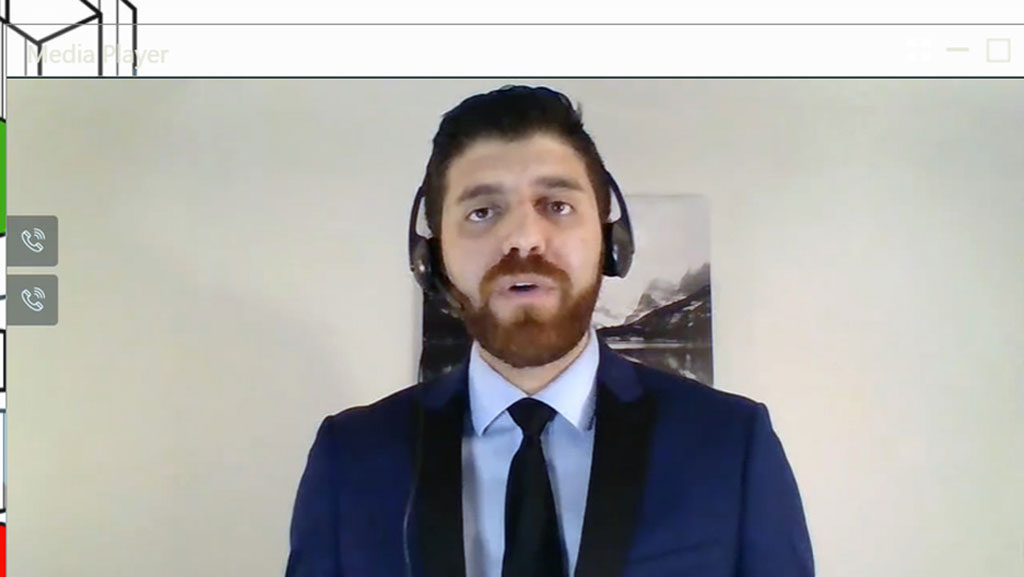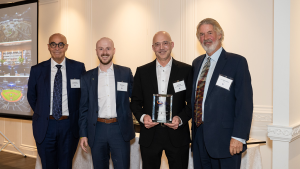For Syrian-Canadian entrepreneur Tareq Hadhad, founder and CEO of Peace by Chocolate, immigrating to Canada meant a new start and an opportunity to grow his family’s business in a new country.
Hadhad was the speaker at the Nov. 23 virtual CEO breakfast, co-hosted by the Toronto Construction Association (TCA) and ConstructConnect.
Hadhad’s family is originally from Syria.
“I’m here because Canada opened the doors for us when many other countries shut them down in our faces after we lost everything in the war in Syria,” said Hadhad. “I’m here for a reason and that reason is because I have a mission to spread the cause of peace.
“I belong to a family that believes in creating change through our business. I belong to a family that believes that whatever the status quo is we have to fight it and we have to advance our own knowledge and education to reach the goals of where we want to be.”
TCA president and CEO John Mollenhauer said they chose Hadhad to be the speaker because of his inspirational story and resilience in the face of adversity.
“We’re a resilient bunch in the industry, we’re pretty good at finding ways around hurdles,” he said, adding there have been many challenges because of the pandemic. “One of the reasons we thought it would make sense to bring in a speaker that doesn’t come from construction is he isn’t afraid of whatever challenges there were in front of him and found a way to overcome them.
“He found a way despite all the odds to become very successful and I see that in our industry all the time.”
It all started when Hadhad’s father, who was a civil engineer, decided his passion was making chocolate instead.
“He went to a wedding and after the meal they started serving very specialty artisan chocolate pieces,” recalled Hadhad. “The whole energy in the room at that wedding changed after the chocolate was served. My father came back home and told my grandmother…‘I am going to make chocolate.’ He said, ‘no one who eats chocolate will ever be sad. Everyone who eats chocolate will be happy.’”
After a few years the company began to grow and by 2005 had become the second largest chocolate factory in the Middle East. Unfortunately, the war in Syria changed everything.
He recalled sitting down to dinner one day with his family in July 2012 and hearing helicopters around the building where he lived with 60 members of his extended family.
“I told my family we have to run to the basement to stay safe because the building was going to be bombed,” he said. “We stayed there for five nights without electricity, without water, without medicine, without food, without any basics or necessities for life.”
Despite this, his family decided to stay in Damascus.
“I was doing training at the hospital to help the injured during the war and I was watching the news and I called my dad,” said Hadhad. “I said, ‘dad you should leave the factory with all your staff members.’ I was watching the news and I knew there were going to be explosions around the building.”
Fifteen minutes later the factory was bombed.
“He didn’t speak to anyone for three days. He just kept saying ‘everything is gone,’” he said. “Everything you build with blood, sweat and tears could be gone in a war. This is the hardest thing you could ever imagine. The chocolate factory was not only a way for us to do business, it was one of us as a family member.”
In March 2013, Hadhad and his brother were injured by a rocket while walking down the street.
“I was injured on my leg,” he said. “My brother lost consciousness. I carried my brother into the house and then we told my family it’s not time to do business, it’s not time to do medicine, this is a time to survive.”
The became refugees in Lebanon but were hoping to immigrate to another country. The family knocked on the doors of 35 countries. A cab driver told Hadhad about a scholarship that Canada was offering to international students and he applied. Once he got accepted he told his family.
They were the first Syrians to live in a small town called Antigonish in Nova Scotia and the community welcomed them with open arms. They started making chocolate.
“We built a small shed beside our house. It was a chocolate mansion,” he said. “It was a representation of humanity coming together with carpenters, electricians.
“Everyone in town came and supported us to start that business and they believed in us.”
While they lost a lot in the war, they did not arrive in Canada empty handed, he noted.
“Refugees might lose their homes, family members, but they don’t lose their skills and their talent. I didn’t lose my knowledge in medicine before coming to Canada. My parents didn’t lose their knowledge in entrepreneurship and starting a business. It’s your intellectual property and nobody can take it away from you.”





Recent Comments
comments for this post are closed